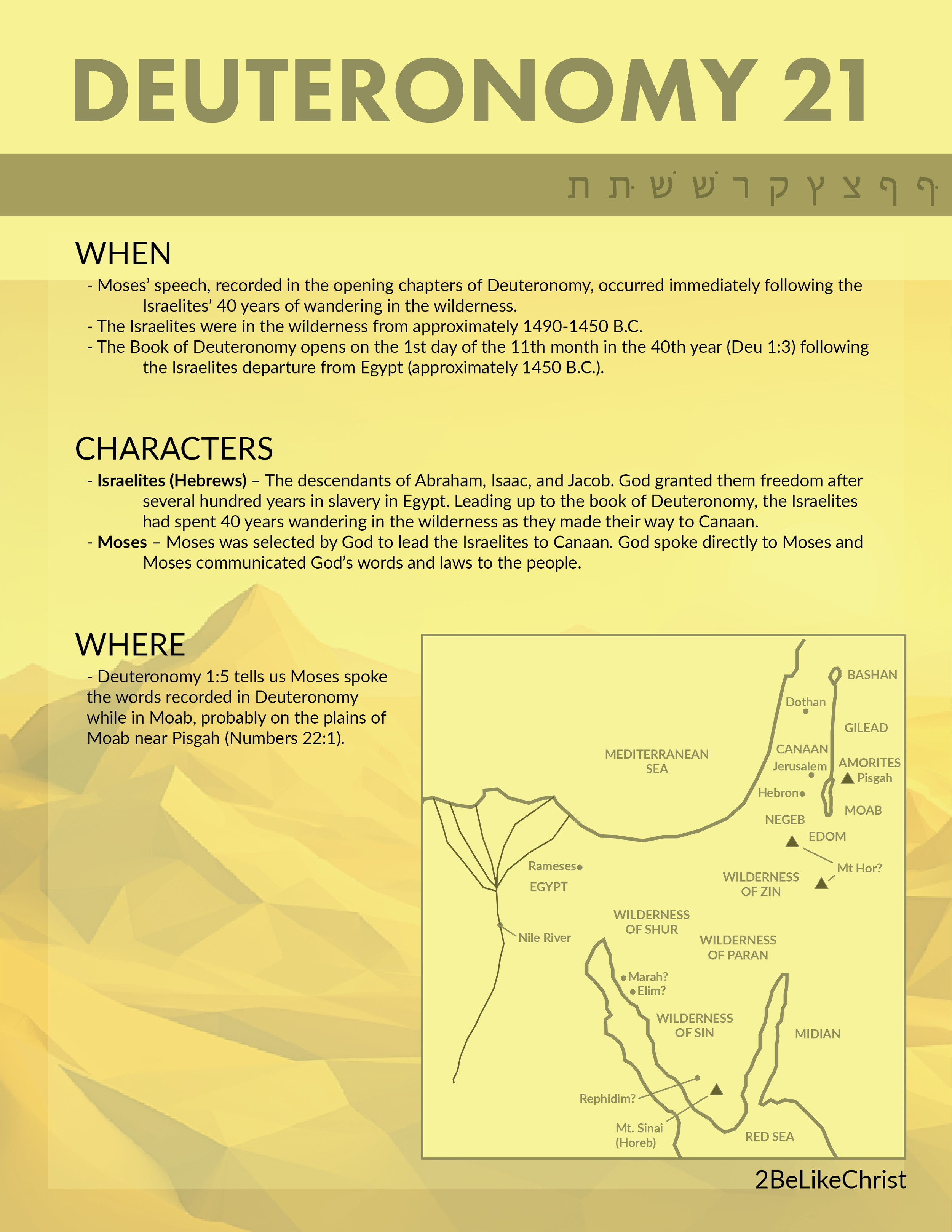Deuteronomy 21 Summary - 5 Minute Bible Study
Deuteronomy 21 Summary - A Quick Overview
WHEN:
Moses’ speech, recorded in the opening chapters of Deuteronomy, occurred immediately following the Israelites’ 40 years of wandering in the wilderness.
The Israelites were in the wilderness from approximately 1490-1450 B.C.
The Book of Deuteronomy opens on the 1st day of the 11th month in the 40th year (Deu 1:3) following the Israelites departure from Egypt (approximately 1450 B.C.).
CHARACTERS:
Israelites (Hebrews) – The descendants of Abraham, Isaac, and Jacob. God granted them freedom after several hundred years in slavery in Egypt. Leading up to the book of Deuteronomy, the Israelites had spent 40 years wandering in the wilderness as they made their way to Canaan, the land God promised to give them as a home.
Moses – Moses was selected by God to lead the Israelites to Canaan. God spoke directly to Moses and Moses communicated God’s words and laws to the people.
WHERE:
Deuteronomy 1:5 tells us Moses spoke the words recorded in Deuteronomy while in Moab, probably on the plains of Moab near Pisgah (Numbers 22:1).
OUTLINE:
MAKING ATONEMENT FOR UNSOLVED MURDERS (21:1-9):
If a person was found murdered in the open country, but the murderer’s identity was a mystery, the elders from the nearest town were to go through a ceremony to cleanse the “guilt of the innocent blood” from their land.
They were to take a heifer, that had never been used for work, down to a valley of running water and break its neck.
The elders were to wash their hands and testify before the priests that they had no knowledge of who killed the man.
When this ceremony was complete, God would remove the blood guilt from their land.
MARRYING FOREIGN FEMALE CAPTIVES (21:10-14):
If and Israelite man wanted to marry a foreign woman taken captive during war, he could do so after she shaved her head, trimmed her nails, removed her foreign clothes, and lamented her father and mother for one month.
If the man decided later that he wanted a divorce, he was to set the woman free. He was not permitted to sell her or treat her like a slave.
LAWS ABOUT THE INHERITANCE OF FIRSTBORN SONS (21:15-17):
If a man had 2 wives, one loved and one unloved, he had to give the firstborn son a double portion of the inheritance, even if the firstborn son was the son of the unloved wife.
He wasn’t allowed to deprive his oldest son of his birthright just because he loved his other wife more.
PUNISHMENT FOR REBELLIOUS SONS (21:18-21):
If a husband and wife had a stubborn and rebellious son who refused to respect them, they were to bring their son before the elders of the city.
The son was to be stoned to death. The son’s actions were considered an “evil” (21:21) that needed to be purged from Israel.
THE CURSE OF HANGING ON A TREE (21:22-23):
If a man was executed for a crime and his body hung on a tree, the Israelites were not to leave the body hanging overnight.
The body was to be buried before the sun went down, because Moses told them, “a hanged man is cursed by God.”
APPLICATION:
Jesus died a humiliating and cursed death to save us from sin.
Paul referenced back to Deuteronomy 21:23 when writing the book of Galatians.
“Christ redeemed us from the curse of the law by becoming a curse for us—for it is written, “Cursed is everyone who is hanged on a tree” (Gal 3:13).
Jesus was hung up on a tree like an executed criminal.
Take some time to appreciate how much Jesus humbled Himself to save us.


